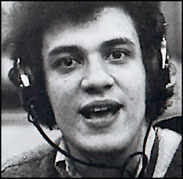BACK to chriscass.us/student_resources
|
Michael Bloomfield's insightful perspective on the myth of Robert Johnson at the crossroads, from an interview given two days before Bloomfield's death in 1981:
"Now Robert was the thing myths are made of. Here was a guy who hung around all the popular blues singers who were making the popular records of that time like I did when I was his age, and he couldn't play worth a damn. He'd try to sit in and they'd say 'Sure, let him play.' And he couldn't play...
"Well these musicians were travelers, and they would leave the area where Robert lived, go away, come back a year later, and Robert would again ask to play, and again he couldn't do it. Two years passed—and I've heard this from four bluesmen who knew Robert Johnson intimately in their younger days—two years passed, and they came back and Robert could not only play, but he could outplay them. He could outplay guys that he could not even vaguely imitate two years prior.
"So, as it has been told to me—and I realize this sounds real strange, but a lot of Southern people believe this—they say that Robert sold his soul to the devil. He went to a fork in the road, to a crossroads, and he put his guitar down there and made a deal with the devil, that the devil would give him the ability to be good with women, good with gambling, and good with the guitar, and in exchange, he could take him at a young age and let him burn in hell. And the devil said that was a good deal.
"...Robert Johnson made that deal, and all the guys who told me this—Johnny Shines, Sunnyland Slim, Muddy Waters, and Elmore James—all of them directly told me that story about Robert selling his soul to the devil.
"Well, Robert got real good, amazingly good, and he had a chance to make some records, and he did, and some people say they're the greatest blues records of all time. I don't know if I agree with that, but I do know that in them you can hear a young man, a young man with an amazing amount of young man's energy...(a) young man who's just burning up his energy. You can hear this in Robert's records; it just leaps off at you from the turntable.
"...So maybe these musicians just know him from the musical standpoint, but I know him as this mythic creature, terror-stricken, trying to run away from whatever is trying to get him".
In the 1930's Robert Johnson lived in a Mississippi so alien to our times that it might as well have been Africa. The culture that produced him was laden with superstition. If superstition can instill enough fear in someone, its terror becomes reality. Robert Johnson sang of the hell hounds on his trail, and it is not unlikely that he saw real dogs snapping at his heels, craving his flesh, waiting for the meal they knew was due them, from the contract.
Robert Johnson Michael Bloomfield
BACK to chriscass.us/student_resource
Text is from Ed Ward's Michael Bloomfield, The Rise and Fall of an American Guitar Hero (used by permission).
Material in quotations is from an interview conducted by Tom Yates in 1981. |




